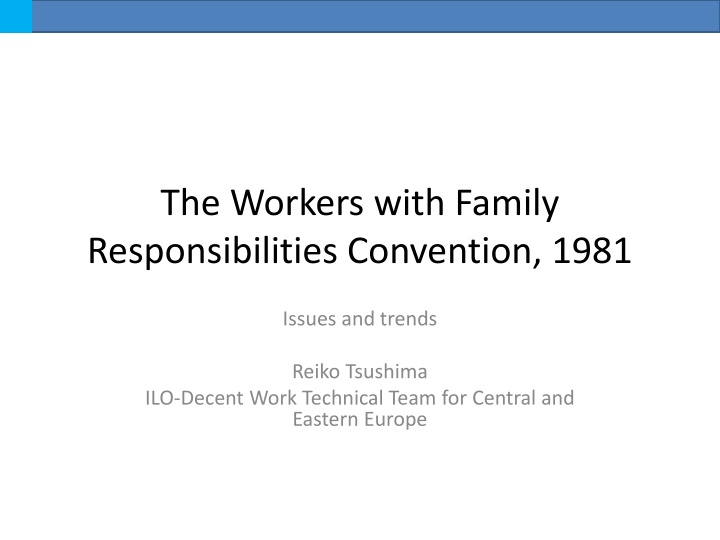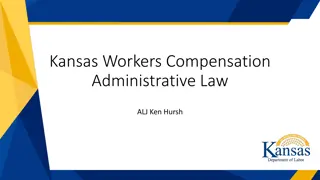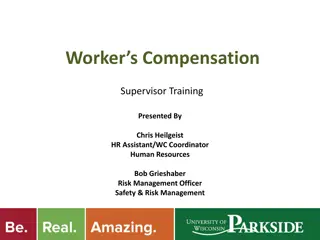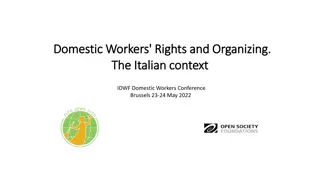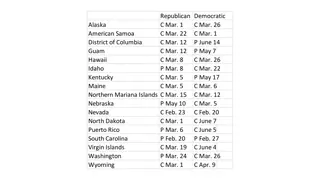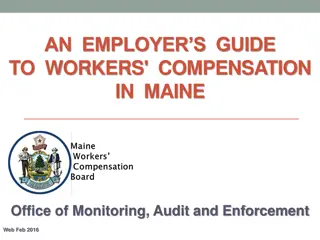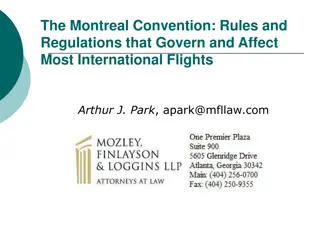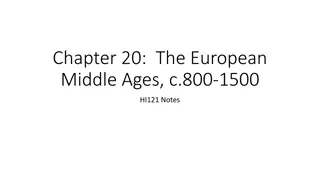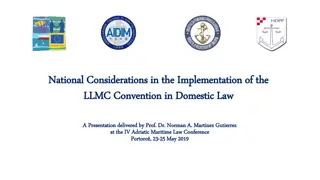Workers with Family Responsibilities Convention: Trends & Standards
The Workers with Family Responsibilities Convention, established in 1981, aims to promote equality between workers with family responsibilities and those without. It covers various aspects such as work and family balance, non-discrimination, and support for dependent children. The Convention applies to a wide range of workers and economic sectors, emphasizing the importance of enabling workers to balance work and family responsibilities without discrimination or conflict. Explore the objectives, scope, and national policy implications of this important international labor standard.
Download Presentation

Please find below an Image/Link to download the presentation.
The content on the website is provided AS IS for your information and personal use only. It may not be sold, licensed, or shared on other websites without obtaining consent from the author.If you encounter any issues during the download, it is possible that the publisher has removed the file from their server.
You are allowed to download the files provided on this website for personal or commercial use, subject to the condition that they are used lawfully. All files are the property of their respective owners.
The content on the website is provided AS IS for your information and personal use only. It may not be sold, licensed, or shared on other websites without obtaining consent from the author.
E N D
Presentation Transcript
The Workers with Family Responsibilities Convention, 1981 Issues and trends Reiko Tsushima ILO-Decent Work Technical Team for Central and Eastern Europe
About the ILO Founded in 1919 185 member States Tripartite structure Sets International Labour Standards And supports implementation Promoting opportunities for women and men to obtain decent and productive work, in conditions of freedom, equity, security and human dignity
International Labour Standards 189 Conventions & 202 Recommendations Reporting on ratified Conventions (art. 22 of the ILO Constitution) The two main ILO bodies involved: Committee of Experts on the Application of Conventions and Recommendations Standards Committee of the International Labour Conference
ILO Standards on work and family International Labour Conventions on Hours of Work, Part-time Work, Holidays, Weekly Rest, Discrimination, Equal Pay International Labour Convention No. 156 and Recommendation No. 165 on Workers with Family Responsibilities International Labour Convention No. 183 and Recommendation No. 191 on Maternity Protection
Objective of the Convention Establish equality of opportunity and treatment Between men and women WFRs Between WFRs and workers that do not have family responsibilities
Scope Applies to all sectors of economic activity and all category of workers full time, part time, temporary, waged or non-wage, and self-employment; (but can be applied in stages) Applies to all men and women workers with family responsibilities For dependent children Any other member of the immediate family who clearly need care and support
National Policy (1) With a view of creating effective equality, make it an aim of national policy to enable WFRs to exercise their right to engage in economic activities without discrimination and, to the extent possible, without conflict between their work and family responsibilities
National Policy (2) Take all measures compatible with national conditions and possibilities to Enable WFR to freely choose their employment (compatible with their needs) Take account of their needs in terms and conditions of work and social security Leave policies (maternity leave, paternity leave, parental leave, emergency family leave) Working time policies (duration, part-time, flexible WA, predictability of working time) Social security benefits (child and family allowances, tax breaks or reductions) Take account of their needs in community planning and development of community services (child care facilities and services)
Other measures Information and education to generate broader public awareness Measures to enable WRP to become and remain integrated in the labour force Family responsibilities not a valid reason for termination of employment
Social partners Employers and workers organizations shall have the right to participate in any manner appropriate to the national conditions, in devising and applying measures taken
Status of ratifications Europe (23) Albania Azerbaijan Bosnia and Herzegovina Bulgaria Croatia Lithuania Montenegro Russian Federation Serbia Slovakia Slovenia Macedonia Ukraine Finland France Greece Iceland Netherlands Norway Portugal San Marino Spain Sweden
Status of ratifications Americas (10) Argentina Belize Bolivia Chile El Salvador Guatemala Paraguay Peru Uruguay Venezuela Africa (5) Ethiopia Guinea Mauritius Niger Yemen Asia (3) Australia Japan Republic of Korea
Some trends & issues from the supervisory process National policies Coverage Terms and conditions of employment Child care Labour market integration Collective bargaining and workplace measures Education for the public
National Policy WF issues should be integrated into all relevant policies, but tendency to use gender policy as a platform Very few countries adopted an explicit or separate national policy on work and family Restricting certain measures to women having children still widely prevalent- CEACR in conflict with principles of gender equality
Coverage Dependent children widely reported, less so for other members of the family but improving Increasing recognition of diverse HH composition: a spouse, de facto partners, child, grandparent, grandchildren, sibling of the employee or spouse or de facto partner (Australia) Some countries categories of workers, eg domestic workers, agricultural workers, part-time workers are excluded, as a result of exclusion due to enterprise size thresholds (Japan, Korea, Ethiopia), hence exclusion from general protection as regards working time.
Terms of conditions Most of the reported progress made relates to new statutory rights and obligations concerning leave entitlement and flexible working time arrangements Need to ensure leave entitlements are available to men and women on an equal footing Parental leave periods should be included in other relevant entitlements eg retirement benefits, seniority and severance pay Increasing attention by CEACR to request information on the take up rate of WFR measures for men and women, emphasizing the need to address imbalance
Labour market integration: report points to women specific measures in ALMS or vocational training programmes, but a specific focus and measure on WF issues often missing Collective bargaining and workplace measures regarding work and family reconciliation appear to be a phenomenon at the present stage largely limited to industrialized countries. Education for the public, including statistics, campaigns, is increasingly asked for in the CEACR observations
Potential of C.156 and challenges Comprehensive focus on WF issues Creates a platform for diverse issues and Ministries to converge Tool to bring workers and employers organizations on- board WFR issues wider than the mandate of one Ministry Inter-ministerial coherence, planning, monitoring and reporting often missing Difficult for MoL to be aware of all that is going on Gov always ask for cost implication how and where to finance it. Employers generally buy-in, but insists on public provisioning of care as the main solution
Need The research community to assist in help build the knowledge of national policy makers on good practice, what is going on in their country, neighboring country Gendered LM outcomes and link to different measures Cost implication of all WF measures To highlight the business case Supply and demand surveys (child care) Worker preference for WL measures
